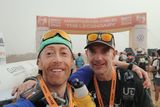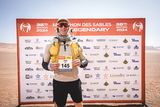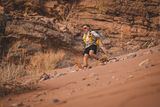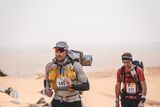Louth runner finishes 69th in legendary Marathon des Sables race across Sahara desert




Running the world’s toughest long distance race in across the Moroccan Sahara desert was a dream come true for Co Louth runner James Redmond.
The Dundalk native, who now lives in Munich, Germany, finished 69th out of a field of over a thousand runners who took part in the gruelling Marathon Des Sables.
“It was an all-round incredible experience,” says James, who works as an engineer with BMW. “To be competing in a field with such amazing athletes from all over the globe and some of the toughest from so many different disciplines was a dream."
The field included Olympians, leaders from elite military units, professional trail runners, mountain climbers, elite marathon runners, cyclists, IRONMAN champions, multiple world record holders and elite divers of all nationalities.
He describes his fellow runners as “such an inspiring group of individuals all forging their own bespoke paths through life with new and fascinating adventures. It really was great company to be in and I made a lot of new friends there.”
The seven-day race, which requires runners to carry their own food and equipment, is rightly known as toughest footrace on earth. Competitors had to content with extreme temperatures, wind and sandstorms and every year some will be forced to quit before reaching the finishing line.
James, who had previously completed six marathons and an ultra, set himself the task of “to do more than just complete” this legendary race which takes place over a 252.8km course with a 2,500m of elevation gain.
“People undertake this challenge with different goals in mind and mine was to be as competitive as I could.”
He prepared rigorously for the event, in terms of physical training and also in calculating what nutrition he needed to bring with him to carry him through seven days of running in gruelling conditions.
“Looking purely at the running side of this adventure I was satisfied that I had trained and prepared well for it all,” he says. “There were, however, aspects that you could never be truly prepared for.
Read more
"While I trained intentionally with reduced levels of sleep I had not realised just how badly disrupted sleep in the desert would be. It seemed that around one o’clock each night the wind would pick up, a mild to relatively strong sand storm would commence and we would spend the following four hours curled up trying to avoid being fully sand blasted in the face. When it would calm, the dust would hang in the air as you breath it in and then settle on your skin, hair, sleeping bag, clothes, bottles, and all other things that were not covered.
"With water rations in place and your mouth constantly drying out from inhaling dust, any sense of relaxation and recovery that you would normally have was greatly reduced. Washing clothes or more specifically drying them was also tricky as you sought out a secure place to hang it but then any wind would usually cover it in sand anyway.
"As the days went on, keeping sand off your skin, particularly any points of contact was important in prevent wear/skin damage but with limited water and limited clean cloths and clothes, some level of damage, wear, blisters was unavoidable.
James describes the campsite and medical tent as looking “more and more like a war zone” as the days went by.
"The wounded clearly identifiable by their red iodine covered feet and limps. A combination of weight and sand then also began to leave chafe and cut marks on people from their backpacks straps and other points of contact with the skin. With no time to rest or let damaged skin recover, small injuries quickly turned to large painful sores as the damage from another Marathon worth of distance was loaded on top.”
James himself had some minor blisters on both feet, some cuts around his side and bruising on his lower back from contact with the bag.
"I was also stung in the Ankle on Stage 2 crossing over a rocky section of trail which caused some swelling and discomfort but thankfully nothing more.”
The weather conditions were indeed extreme, he says, reaching 52 degrees at one stage.
"A tent-mate was found unconscious on the final straight but thankfully received some aid to lower his temperature and he managed to not only finish the stage but finish the entire event.”
“Others that we spoke with were not so lucky as intervention could not quickly bring their temperatures in line and they were deemed unfit to go on ,” he says.
Despite having to endure these extreme conditions, James says that the support the competitors received was “amazing”.
“The support teams at checkpoints were extremely attentive, taking time to speak with athletes and ensure that all were alert and fit to continue.“
James decided to raise funds for Medical Aid for Palestine and so far has raised over €6,000. Donations can be made to his page on justgiving.com
















